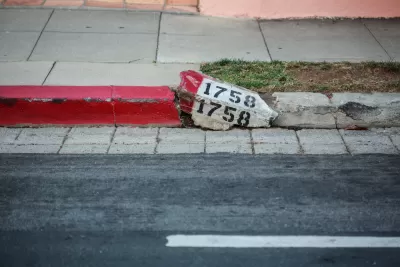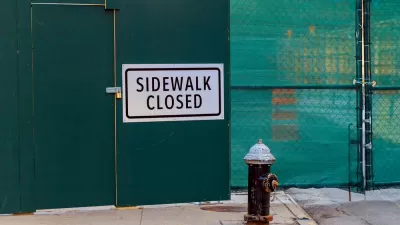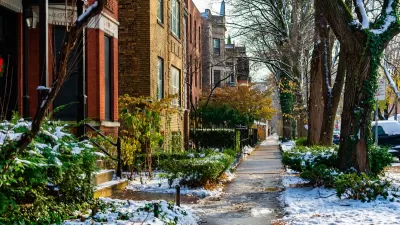In some cities, maintenance of sidewalks is not the responsibility of the city but of adjacent landowners. Philadelphia is finding what a hassle this arrangement can be. With countless blocks in disrepair, everyone is passing the buck.

Back in 1891, the city of Philadelphia adopted an ordinance assigning responsibility for sidewalk maintenance to adjacent landlords. This seemed like a good idea at a time when everyone walked and before laws like the Americans With Disabilities Act required that sidewalks always provide safe passage.
Today, many Philly sidewalks are impassible not just to citizens in wheelchairs, but also to just about anyone short of a mountain goat. And the city is finding, not surprisingly, that landlords and neighborhood associations aren't eager to pay up. The city has tried to fine landlords, but the fines are often paltry compared to the cost of compliance.
Neighborhood groups are searching for creative solutions. One of them suggests a list of "Top-10 Offenders" in case a public display might spur landlords to action.
"[P]articularly outside of Center City, where busted, tree-root shimmed and all-but-obliterated sidewalks are distressingly common. Philadelphia’s walkability is one of its chief strengths—but not on those stretches where sidewalks are in gross disrepair."
FULL STORY: Lots of Philadelphia Sidewalks Are in Horrible Shape — How to Fix Them?

Planetizen Federal Action Tracker
A weekly monitor of how Trump’s orders and actions are impacting planners and planning in America.

Restaurant Patios Were a Pandemic Win — Why Were They so Hard to Keep?
Social distancing requirements and changes in travel patterns prompted cities to pilot new uses for street and sidewalk space. Then it got complicated.

Maui's Vacation Rental Debate Turns Ugly
Verbal attacks, misinformation campaigns and fistfights plague a high-stakes debate to convert thousands of vacation rentals into long-term housing.

In California Battle of Housing vs. Environment, Housing Just Won
A new state law significantly limits the power of CEQA, an environmental review law that served as a powerful tool for blocking new development.

Boulder Eliminates Parking Minimums Citywide
Officials estimate the cost of building a single underground parking space at up to $100,000.

Orange County, Florida Adopts Largest US “Sprawl Repair” Code
The ‘Orange Code’ seeks to rectify decades of sprawl-inducing, car-oriented development.
Urban Design for Planners 1: Software Tools
This six-course series explores essential urban design concepts using open source software and equips planners with the tools they need to participate fully in the urban design process.
Planning for Universal Design
Learn the tools for implementing Universal Design in planning regulations.
Heyer Gruel & Associates PA
JM Goldson LLC
Custer County Colorado
City of Camden Redevelopment Agency
City of Astoria
Transportation Research & Education Center (TREC) at Portland State University
Camden Redevelopment Agency
City of Claremont
Municipality of Princeton (NJ)





























